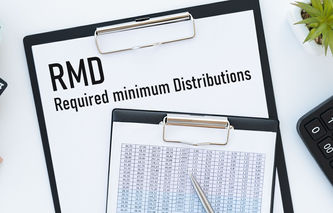There was a time when retiring with a mortgage was unthinkable. Making that last payment was something to celebrate, and that achievement was shared with family and friends. There was even a name for those celebrations; they were called mortgage-burning parties.
In this article, we're going to discuss the pros and cons of retiring with a mortgage. We'll begin by citing some government-sponsored research that provides several interesting statistics on the number of retirement age individuals that are still paying off the loans on their homes. Next, we'll talk about the various factors to consider when deciding if paying off a mortgage is a good idea. Finally, we'll expand that thought process into a retirement planning scenario.
Families with Mortgages
Every three years, the Federal Reserve Board publishes its Survey of Consumer Finances (SCF). This survey is based on the responses of 4,500 families that are representative of the economic conditions existing in the United States. The survey includes demographic characteristics, as well as pension and income information.
The data we're using in this article was published in September 2020, and is a summary of data gathered in the years 1989 through 2019. The table below tells us the percentage of families that still have a mortgage or home-equity loan, sorted by the age of the head of household.
Percent of Families with Mortgages / Equity Loans
Age of Head of Household | ||||||
Year | < 35 | 35 – 44 | 45 - 54 | 55 - 64 | 65 - 74 | > 75 |
1989 | 34.9% | 57.5% | 56.9% | 34.1% | 20.6% | 5.8% |
2004 | 37.7% | 62.2% | 62.5% | 46.3% | 29.1% | 15.7% |
2007 | 37.1% | 59.3% | 63.8% | 50.2% | 35.5% | 11.0% |
2010 | 33.9% | 57.3% | 58.5% | 50.6% | 36.6% | 21.2% |
2013 | 28.6% | 52.7% | 55.3% | 45.8% | 38.9% | 18.6% |
2016 | 28.2% | 49.6% | 52.2% | 45.8% | 35.2% | 23.2% |
2019 | 30.3% | 53.7% | 54.0% | 46.2% | 37.6% | 27.7% |
To simplify this analysis, we'll consider families where the head of household was age 65 and older as "retired with a mortgage." The observations we can make based on this research include:
Back in 1989, just a little over a quarter of all households (26.4%) were living as "retired with a mortgage."
By 2007, nearly half (46.5%) of all households could be classified in the same manner. This is a 76% increase in just 18 years.
From 2007 to 2010, there was a 200% increase in the use of mortgages for families where the head of household was age 75 and older.
The average monthly retirement income in California in 2021 was $2,968, according to the U.S. Census Bureau.
In our second set of data, we're going to look at how much debt these retirees are carrying.
Average Value of Mortgages / Equity Loans ($000)
Age of Head of Household | ||||||
Year | < 35 | 35 – 44 | 45 - 54 | 55 - 64 | 65 - 74 | > 75 |
1989 | 86.2 | 83.9 | 59.0 | 55.3 | 25.9 | 33.9 |
2004 | 136.2 | 144.7 | 143.8 | 128.5 | 85.4 | 73.1 |
2007 | 163.0 | 160.4 | 148.4 | 140.2 | 133.5 | 80.1 |
2010 | 142.5 | 174.8 | 165.2 | 144.3 | 124.2 | 82.9 |
2013 | 141.5 | 183.8 | 166.2 | 155.5 | 132.3 | 86.1 |
2016 | 142.2 | 189.9 | 186.1 | 156.6 | 117.9 | 91.6 |
2019 | 170.8 | 224.3 | 205.0 | 165.8 | 140.9 | 116.1 |
Again, we're using the simplifying assumption that a head of household age 65 and older is "retired with a mortgage." Based on this second set of data, we can conclude:
The average mortgage, or home equity loan, for retired families where the head of household was age 75 and older increased in size 136% from 1989 ($33,900) to 2007 ($80,100).
Even more incredible, when the head of household was age 65 to 74, there was a 415% increase in the size of the loan from 1989 ($25,900) to 2007 ($133,500).
The 2016 and 2019 data sustains the continuous climb in mortgage and home equity loans.
Based on these two sets of data, we know the number of retirees with mortgages has been increasing. Overall, we now have a lot more debt held by those in retirement than we did back in the late 1980s.
Paying off a Mortgage
Note: We're going to start this section with a warning. A mortgage is typically the largest loan carried by a household. Paying off a mortgage is a very big decision that needs to be thoroughly evaluated before taking any action. The information below needs to be considered along with a variety of other factors in each household.
Anyone looking to pay off a mortgage must have excess funds that can be "invested" in their loan. Once that condition exists, the lost opportunity cost is the primary factor determining whether paying down (or paying off) a mortgage is a sound decision. The opportunity cost would be the alternative investment. For example, someone could choose to invest in the stock market instead of paying off the loan on their home.
Paying off a mortgage is a low risk investment. Money applied directly towards the loan's principal provides the individual with a return on investment that is equal to the interest rate on the loan. Since this is true, we can make two generalizations:
When the interest rate on a mortgage is higher than an alternative "risk-free" investment such as a certificate of deposit (CD), then it's better to pay down the mortgage than invest in the CD.
When the interest rate on a mortgage is lower than an alternative "risk-free" investment such as a certificate of deposit, then it's better to invest in the CD than pay down the mortgage.
Alternatives to Consider
One of the simple rule of thumb used by many financial planners is that we need to have enough resources to replace 70 to 80% of our income when retired. The rationale is that when retired our expenses should be lower. For example, retirees no longer have a commuting expense to travel back and forth to work each day. This rule was also developed at a point in time when very few retirees had a mortgage to worry about each month.
Based on the rules mentioned above, it might be tempting to use a 401(k) plan or Roth IRA to pay off a mortgage if prevailing rates of return for those plans are lower than the interest rate on a mortgage. Unfortunately, these decisions are not that simple.
Living a comfortable retirement means balancing the desire to pay off a mortgage with the need to have a readily available source of savings to help pay for unexpected expenses. The last thing anyone would want to do is pay off a mortgage, and then be forced to take out a home equity loan to pay for medical expenses.
If someone is carrying high cost loans such as credit card debt, then it makes sense for them to pay off a credit card before turning their attention to a mortgage. Similarly, if an investment can earn a higher rate of return than the interest rate charged on a mortgage, then making the investment is a better choice. Just keep in mind that higher returns are often accompanied by higher risk.
In the end, anyone trying to figure out if retiring with a mortgage is a good idea will need to consider:
Alternatives: are there risk free investments that provide a higher rate of return than the interest rate on the mortgage or home equity loan?
Liquidity: the last thing anyone wants to do is use all their readily-accessible money to pay down a mortgage, and then borrow money for a "rainy day" expense.
The ideal situation is when someone has a relatively large sum of money in the bank and a modest mortgage. Paying down a mortgage might make a lot of sense; especially if it's currently invested in a certificate of deposit earning 1.5%. But paying down a mortgage by pulling a large sum of money from a 401(k) or 403(b) account can also trigger a hefty year-end tax bill. That's why we mentioned in the beginning of this article the answer to this question is not straightforward.
It's also the reason why we recommend seeking advice from a financial planner that can help make a recommendation based on a comprehensive view of someone's overall financial condition. After all, individuals approaching retirement age don't have a lot of time to recover from a financial mishap, and making the wrong move could mean going back to work.



